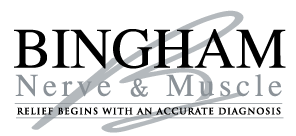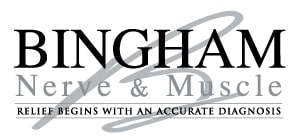Frequently Asked Questions
You have been referred to Bingham Nerve & Muscle for a nerve and muscle test because you have experienced symptoms such as numbness, tingling, pain, weakness, or muscle cramping. If your provider suspects that you may have a problem with your nerves or muscles, this test will likely be an important part of your evaluation. We strive to be mindful of your day! Your entire visit, including paperwork, wait time, and testing, will last about 60-90 minutes from the time you arrive to the time you leave.
An EMG/NCS or nerve and muscle test is a two part diagnostic test. The nerve conduction study or NCS is the first portion of the nerve and muscle test (EMG/NCS or electromyography). This portion of the test evaluates how the nerves or "wires" in the arms and legs are working.
A Certified Nerve Conduction Technologist (CNCT), under the direct supervision of the doctor, will make several recordings of how "fast or slow" brief, electrical impulses travel through the nerves. Patients will experience a mild, "tingly or shocking" sensation during this portion of the study. Nerve conduction studies are safe, have no side effects, and are well-tolerated by most patients, including children.
Our technologists understand that everyone's tolerance is different. Occasionally, some patients may be hesitant or have difficulty tolerating the study. We want every patient to feel safe and in control. If any patient is ever unable to tolerate the study, the study can be stopped at any time. The purpose of the EMG and nerve conduction study is to determine how the nerves and muscles are working, and if you have an irritated nerve or another peripheral nerve disorder.
An EMG/NCS or nerve and muscle test is a two part diagnostic test. The terms "electromyography" or "EMG" are often used in conversation as abbreviated ways to refer to the entire nerve and muscle test, however the test is actually two specific parts: EMG and NCS.
The electromyography or EMG is the second portion of the nerve and muscle test (EMG/NCS). The EMG is performed the same day, right after the nerve conduction study, by a board certified physician. During this part of the test, one tiny needle (similar to one acupuncture pin/needle) is placed into different muscles (not the nerve) to directly test the function and health of the muscles. A mild “pinprick” sensation may be felt when the needle is placed into the muscle.
During the EMG testing, no electrical stimulation is delivered through the needle and nothing is injected through the needle tip. You can think of the needle as being similar to a tiny microphone. It is only a recording device. The needle is attached via a cable to a special computer which allows the physician to both hear and see what the muscle is doing both at rest and with movement. The purpose of the EMG and nerve conduction study is to determine how the nerves and muscles are working, and if you have an irritated nerve or another peripheral nerve disorder.
Four years of college
Four years of medical school
Four years of residency in Physical Medicine and Rehabilitation (Physiatry) or Neurology
Board certification in Physical Medicine and Rehabilitation (ABPMR) or Neurology (ABPN) and
Board certification in Electrodiagnostic Medicine (ABEM)
Some patients may experience a small amount of discomfort associated with the nerve conduction study. Most patients describe the sensation as a shock or tingle feeling that lasts for less than a second. The majority of our patients tolerate this part of our test very well. All of our staff have experienced these tests, so we are able to understand your concerns and put your mind at ease. With the EMG needle portion of the test, many of our patients are surprised with the little discomfort they experience. Most patients will say they worried for nothing. However, if a patient feels they are unable to tolerate the test, we can stop the test at any time.
Before your test, please take a bath or shower to remove oil from your skin. Do not use body lotion or powder the day of your test to improve the quality of the test results.
It is best to wear loose clothing that is easy to remove. You may bring or wear loose-fitting shorts and a t-shirt if you wish. We also have shorts and gowns available for our patients.
Please bring your insurance cards and a valid form of identification. Also to save time, you may download and complete our patient forms to bring with you.
We understand your time is valuable. We do our best to see all of our patients in a timely manner, so you have to wait the least amount of time possible. Occasionally, we have to spend a little more time with a patient, but we try our best to get you in and out of the office in a timely manner so you can get on with your day.
Our physicians do testing only. They will not discuss the diagnosis or treatment of your condition. Please return to your referring provider for further care. Typically formal reports are faxed to your physician within 24 hours. The EMG is just one part of the jigsaw puzzle; your physician will evaluate the results of the EMG along with any other investigations he or she deems necessary in order to give you the most accurate diagnosis possible.

